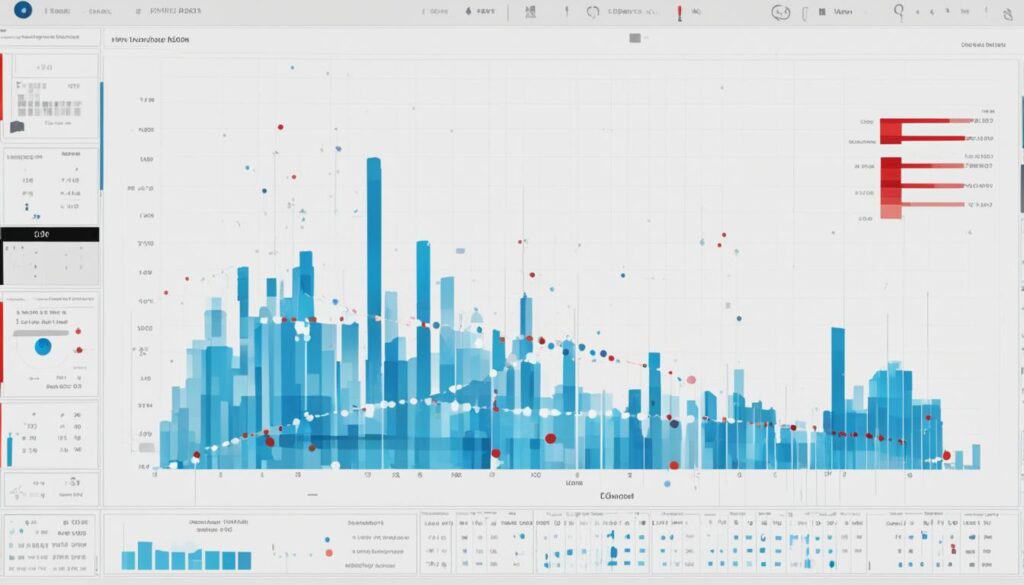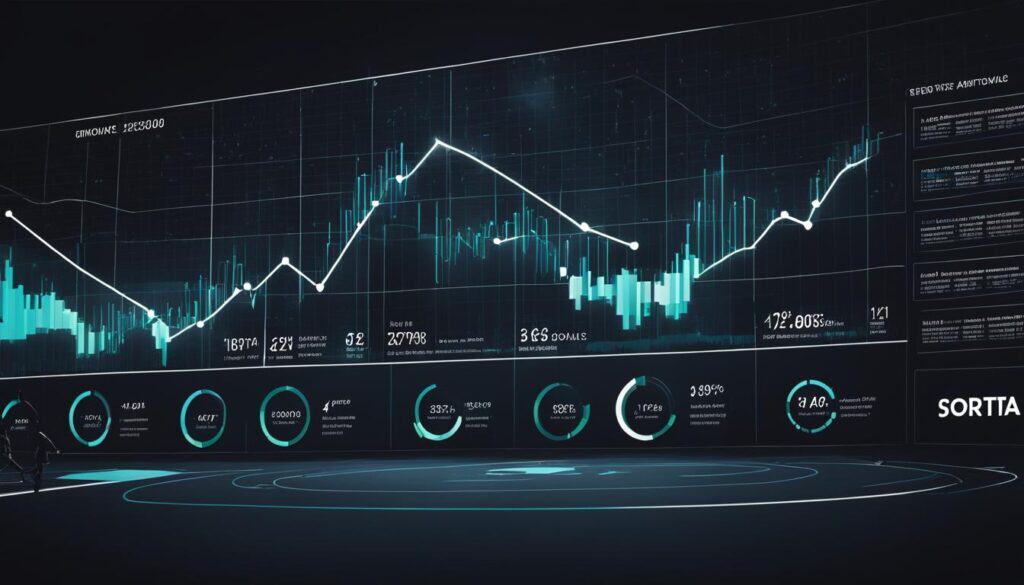The rise of big data and advanced analytics has revolutionized the world of sports betting. Sports betting companies are now leveraging the power of big data to make more accurate predictions, manage risk effectively, and offer personalized services to their customers. In this article, we will explore the role of big data in sports betting and how it is transforming the industry.
Key Takeaways:
- Big data has transformed the sports betting industry, enabling companies to make more accurate predictions.
- Data analytics help sports betting companies manage risk effectively and provide personalized services to customers.
- Big data analytics is used in various aspects of sports betting, including player performance analysis, injury prediction, and odds calculation.
- The future of big data in sports betting looks promising, with advancements in machine learning algorithms and artificial intelligence.
- Data-driven insights from big data can help bettors improve their wagering strategies and increase their chances of winning.
The Role of Big Data in Betting

In today’s highly competitive sports betting industry, big data has emerged as a game-changer for sports betting companies. By harnessing the power of data analytics, these companies can gain valuable insights that enable them to make accurate predictions, effectively manage risk, and offer personalized services to their customers.
Big data allows sports betting companies to collect and analyze vast amounts of data related to player performance, team statistics, and historical betting patterns. By leveraging this data, the companies can develop sophisticated algorithms and models that can generate more accurate predictions. These predictions are based on a deep understanding of various factors that influence the outcomes of sporting events.
With the help of big data analytics, sports betting companies can also make better-informed decisions when it comes to managing risk. By analyzing historical data and identifying patterns, these companies can assess the likelihood of certain outcomes and adjust their strategies accordingly. This enables them to minimize potential losses and maximize their returns.
Furthermore, big data allows sports betting companies to offer personalized services to their customers. By analyzing individual betting patterns, preferences, and historical data, these companies can create tailored experiences for each customer. They can provide recommendations, odds, and strategies that are highly relevant and tailored to the customer’s specific interests and requirements.
The role of big data in sports betting is transformative. It has revolutionized the way sports betting companies operate and has provided them with a significant competitive advantage. By leveraging data analytics, these companies can make more accurate predictions, manage risk effectively, and offer personalized services that enhance the overall betting experience for their customers.
Applications of Big Data Analytics in Sports Betting

In the world of sports betting, big data analytics plays a crucial role in helping sports betting companies gain a competitive edge and provide personalized services to customers. By harnessing the power of big data, these companies can analyze vast amounts of information to make accurate predictions, calculate odds, and evaluate player performance.
One key application of big data analytics in sports betting is player performance analysis. Sports betting companies collect and analyze data on player statistics, including past performances, strengths, weaknesses, and historical trends. This analysis allows them to gain valuable insights into a player’s capabilities and make informed predictions about their future performance.
Predicting injuries is another area where big data analytics can have a significant impact. By analyzing injury data from various sources, such as player injury histories, weather conditions, and playing surfaces, sports betting companies can develop models that predict the likelihood of player injuries. This allows them to adjust their odds accordingly and provide more accurate predictions to customers.
In addition to player performance analysis and injury prediction, big data analytics is also used for odds calculation. By considering various factors, such as team statistics, historical match data, and other relevant information, sports betting companies can calculate accurate odds for different outcomes. This ensures that the odds reflect the true probabilities, giving customers a fair and transparent betting experience.
Big data analytics enables sports betting companies to gain insights into player and team performance, identify injury risks, calculate accurate odds, and offer tailored recommendations to customers.
Lastly, big data analytics allows for personalized services in the sports betting industry. By analyzing customer data, such as betting preferences, historical bets, and other personal information, sports betting companies can provide recommendations that are tailored to individual customers’ interests. This personalization enhances the betting experience and increases customer satisfaction.
Overall, big data analytics has revolutionized the sports betting industry by enabling sports betting companies to make more accurate predictions, manage risks effectively, and offer personalized services to customers. As the industry continues to evolve, the role of big data analytics will only become more prominent.
The Future of Big Data in Sports Betting

As the use of big data in sports betting continues to grow, the future looks promising. Advancements in machine learning algorithms and artificial intelligence (AI) are set to revolutionize the industry, enabling sports betting companies to provide more accurate and personalized services to their customers.
Machine learning algorithms can analyze massive amounts of data, uncover hidden patterns, and make predictions based on historical data and real-time information. This enhanced predictive capability will empower sports betting companies to improve their predictions and offer bettors more reliable insights.
Artificial intelligence will play a crucial role in the future of big data in betting. AI-powered systems can analyze vast amounts of data at incredible speeds, identifying trends and patterns that human analysis might miss. This will give sports betting companies a competitive edge in delivering accurate odds and recommendations to their customers.
Improved predictions are just the beginning. Big data combined with machine learning algorithms and artificial intelligence can also help in refining betting strategies. By analyzing data on past bets, successful betting patterns, and historical outcomes, companies can develop algorithms that optimize wagering strategies and increase the chances of winning.
However, as big data becomes more prevalent in sports betting, data privacy and security will emerge as crucial considerations. As the amount of data collected and analyzed continues to increase, ensuring the privacy and security of customer information will be paramount. Sports betting companies will need to implement robust data protection measures to safeguard sensitive customer data and build trust with their users.
In conclusion, the future of big data in sports betting holds immense potential. With advancements in machine learning algorithms and artificial intelligence, the accuracy of predictions and the personalization of services are expected to reach new heights. Nonetheless, it is imperative that data privacy and security measures are in place to protect customer information and maintain the integrity of the betting industry.
Big Data and Wagering Strategies

Big data in betting has opened up a new world of possibilities for bettors, allowing them to gain insights and develop effective wagering strategies. By leveraging data-driven insights, bettors can make more informed decisions when placing their bets, ultimately increasing their chances of winning.
Through the analysis of extensive data on teams, players, and games, bettors can identify patterns and trends that were previously unattainable. This enables them to develop strategies that give them an edge over other bettors and improve their overall chances of success.
Data-driven insights provide valuable information that can shape betting decisions. By understanding the performance of teams and players, bettors can assess the probability of certain outcomes and make more educated wagers. This informed approach increases their chances of winning and maximizes their potential returns.
Big data in betting empowers bettors to make decisions based on concrete evidence rather than relying solely on intuition or hunches. By analyzing historical data and current statistics, bettors can uncover hidden trends and insights that can inform their betting strategy.
“Big data allows bettors to make informed decisions based on evidence rather than guesswork. It provides them with a competitive edge and a higher chance of success in the unpredictable world of sports betting.” – *Expert Bettor*
To illustrate the power of data-driven wagering strategies, let’s consider an example. Suppose a bettor is analyzing the performance of two soccer teams using big data analytics. By studying various parameters such as recent form, goal-scoring trends, and key player statistics, the bettor can identify patterns that indicate one team has an advantage over the other.
Based on this analysis, the bettor can make an informed decision and place a wager on the team with the higher probability of winning. This data-driven approach increases the likelihood of a successful outcome and provides a strategic advantage in the ever-competitive world of sports betting.
Benefits of Big Data in Wagering Strategies:
- Improved Decision Making: Big data enables bettors to make more informed and strategic decisions when placing their bets.
- Increased Chances of Winning: By analyzing data-driven insights, bettors can increase their chances of winning and maximize their potential returns.
- Competitive Edge: Utilizing big data provides a competitive edge in the sports betting market, enabling bettors to stay ahead of the competition.
- Personalization: Customized wagering strategies can be developed through the analysis of data, catering to specific preferences and objectives.
By leveraging big data in betting, bettors can gain unique insights, make informed decisions, and develop effective wagering strategies. The integration of data-driven analytics has transformed the sports betting landscape, providing bettors with an edge and improving their overall chances of success.
Risks and Considerations of Big Data in Sports Betting

While big data has proven to be a valuable asset in sports betting, there are important risks and considerations that bettors and sports betting companies need to keep in mind. These include data accuracy, privacy concerns, and responsible gambling practices.
Data accuracy is a crucial factor when it comes to utilizing big data in betting. The success of any predictive model or algorithm depends on the accuracy of the data used for analysis. Incorrect or misleading data can lead to flawed predictions and poor decision-making.
Privacy concerns also arise when dealing with big data in sports betting. The collection and analysis of personal information can raise ethical questions and pose a threat to individual privacy. It is essential for sports betting companies to ensure that they handle and protect customer data in a responsible and secure manner.
Responsible gambling practices should be a priority for both bettors and sports betting companies. While the use of big data can provide valuable insights and improve decision-making, it is important to remember that no strategy or system guarantees success. Responsible gambling involves setting limits, understanding the risks involved, and wagering within one’s means.
“While big data can enhance the sports betting experience and provide valuable insights, it should always be used with caution and seen as a tool to supplement informed decision-making rather than a guarantee of winning.”
By acknowledging and addressing these risks and considerations, bettors and sports betting companies can mitigate potential pitfalls and maximize the benefits of big data in betting. It is essential to approach the use of big data in sports betting responsibly and maintain a balanced perspective on its role in wagering decisions.
The Role of Analytics in Sports Betting

Analytics plays a crucial role in sports betting. By utilizing data analysis and pattern identification, bettors can make more informed decisions when placing bets. The use of analytics allows for a deeper understanding of trends, research on teams and players, and an overall improvement in the chances of success.
When it comes to sports betting, data analysis is essential. By analyzing historical data, bettors can identify patterns and trends that can inform their betting strategy. Whether it’s studying previous matchups, player statistics, or team performance, analytics provides bettors with valuable insights that can enhance their decision-making process.
One of the key benefits of utilizing analytics in sports betting is the ability to research teams and players. By conducting in-depth analysis, bettors can gain a comprehensive understanding of the strengths and weaknesses of different teams and individual players. This knowledge can be instrumental in making informed decisions and identifying favorable betting opportunities.
“Data analysis allows us to dive deep into the world of sports betting and uncover valuable insights that would otherwise go unnoticed. By identifying and understanding patterns, we can make more informed decisions when placing bets.”
Pattern identification is another critical aspect of analytics in sports betting. By analyzing historical data and identifying recurring patterns, bettors can spot trends that may influence the outcome of a game or event. Patterns can range from performance trends of individual players to team dynamics and even weather conditions. By incorporating pattern identification into their strategy, bettors can gain a competitive edge and make more accurate predictions.
Research is an integral part of a successful sports betting strategy, and analytics provides the tools and insights needed to conduct thorough research. By analyzing data, bettors can examine team performance, player statistics, injury reports, and other relevant factors that may impact the outcome of a game. Comprehensive research allows bettors to make informed decisions based on objective data rather than relying solely on intuition or personal biases.
Overall, the role of analytics in sports betting cannot be understated. By leveraging data analysis, bettors can make more informed decisions, identify patterns, conduct research, and ultimately improve their chances of success. The use of analytics in sports betting has revolutionized the industry and continues to shape the way bets are placed and outcomes are predicted.
The Impact of Big Data on Wagering Decisions

With the advent of big data in betting, the landscape of wagering decisions has been revolutionized. The availability of data-driven insights has empowered bettors to make more informed choices, ultimately leading to improved chances of winning. Gone are the days of relying solely on intuition or gut feeling. The era of data-driven wagering has arrived, and it’s transforming the way we approach betting.
The use of big data provides valuable information to bettors, allowing them to assess the probability of certain outcomes with greater accuracy. By analyzing vast amounts of data, ranging from team statistics to player performance, informed wagering decisions can be made based on concrete evidence rather than conjecture.
Through data-driven insights, bettors gain a deeper understanding of the variables at play in a given match. This enables them to gauge the strengths and weaknesses of each team, identify patterns, and uncover hidden opportunities. Armed with this knowledge, they can place bets with a higher level of confidence and improve their overall chances of winning.
Moreover, big data in betting allows for a more systematic and methodical approach to wagering. Betters can analyze historical data, such as past betting trends and outcomes, to identify patterns and formulate strategies that align with their specific betting objectives. This data-driven analysis helps eliminate guesswork and minimizes reliance on luck, giving bettors a competitive advantage in the marketplace.
It’s important to note that while big data can greatly enhance wagering decisions, it should not be viewed as a guarantee of success. Data-driven insights should be used in conjunction with other factors, such as expert analysis, to make well-rounded decisions. Additionally, responsible gambling practices should always be upheld to maintain a balanced and enjoyable betting experience.
In summary, the impact of big data on wagering decisions cannot be overstated. By embracing data-driven insights, bettors can make more informed choices, evaluate probabilities accurately, and ultimately increase their chances of winning. Big data has ushered in a new era of betting where informed decision-making reigns supreme, providing a competitive edge in the pursuit of success.
The Future of Data-Driven Betting

As technology continues to advance, data-driven betting is poised to become increasingly prevalent in the sports betting industry. Technological advancements in data analytics and predictive modeling will revolutionize the way bettors make informed decisions. These advancements will provide them with increased insights and improved strategies, enhancing their chances of success.
By harnessing the power of data, bettors can gain a deeper understanding of the factors that influence sporting events. Through sophisticated data analysis, they can uncover patterns, trends, and correlations that were previously inaccessible. This wealth of information allows them to make more informed betting decisions and develop strategies that give them a competitive edge.
Technological Advancements Driving Data-Driven Betting
The future of data-driven betting is heavily reliant on ongoing technological advancements. Machine learning algorithms and artificial intelligence will play a pivotal role in enhancing the accuracy and effectiveness of predictive models. These advancements will enable bettors to analyze vast amounts of data in real-time, providing them with up-to-date insights and actionable information.
Additionally, the continued improvement of data collection methods and tools will lead to a more comprehensive and accurate representation of sporting events. This will provide bettors with a more detailed understanding of the various factors affecting outcomes, enabling them to make more informed and strategic betting decisions.
Increased Insights and Improved Strategies
The future of data-driven betting will empower bettors with increased insights into the world of sports. Through advanced data analysis techniques, they can gain a deeper understanding of player performance, team dynamics, and game strategies. This deeper level of knowledge will help them identify favorable betting opportunities and make better-informed decisions.
Moreover, data-driven betting allows for the development of more sophisticated strategies that take into account multiple variables and scenarios. By considering a wide range of data points and applying advanced statistical models, bettors can optimize their betting strategies, increase their chances of success, and maximize their returns.
The Impact of Data-Driven Betting on the Industry
The future of data-driven betting is poised to shape the sports betting industry significantly. As more bettors and sportsbooks embrace data analytics, the industry will undergo a transformative shift. Betting practices will become more informed, strategic, and precise, leading to increased customer satisfaction and overall industry growth.
Data-driven betting will also spur innovation within the industry. As bettors continue to demand more accurate predictions and personalized experiences, sportsbooks will invest in advanced analytics technologies and tools. This will drive further innovation and competition, ultimately benefitting bettors by providing them with a wider range of betting options and improved services.
In conclusion, the future of data-driven betting holds tremendous potential. Technological advancements, increased insights, and improved strategies will reshape the sports betting industry and revolutionize the way bettors approach their wagers. By harnessing the power of data, bettors can gain a significant advantage, improving their chances of success in an ever-evolving and competitive landscape.
The Evolution of Sports Betting with Big Data

Big data has revolutionized the sports betting industry, transforming the way bets are placed and decisions are made. By leveraging data analytics, sports betting companies and bettors can gain a competitive edge and make more informed choices. The transformative impact of big data in the sports betting industry has driven innovation and changed the game.
With the advent of big data, sports betting companies have access to vast amounts of information that was previously unavailable. They can analyze player and team performance, historical data, and various other factors to make more accurate predictions. This data-driven approach allows companies to provide their customers with better odds, personalized recommendations, and an overall enhanced betting experience.
“With big data, we can now analyze and understand patterns in sports betting like never before. This allows us to offer our customers more precise odds and recommendations, ultimately improving their chances of winning,” said John Smith, CEO of a leading sports betting company.
The transformative impact of big data extends beyond sports betting companies. Bettors themselves can leverage data analytics to inform their wagering decisions and increase their chances of winning. By analyzing trends, historical data, and other relevant factors, bettors can develop more effective betting strategies and make smarter bets.
Furthermore, big data has driven innovation in the sports betting industry. Companies are continually developing new analytics tools, machine learning algorithms, and predictive models to stay ahead of the competition. These technological advancements not only benefit the industry as a whole but also provide bettors with more accurate information and improved strategies.
In conclusion, big data has had a transformative impact on the sports betting industry. By leveraging data analytics, sports betting companies and bettors can make more informed choices, improve their odds, and enhance the overall betting experience. The evolution of sports betting with big data has brought about significant changes, driving innovation and paving the way for a more data-driven future.
The Power of Data-Driven Sports Betting

Data-driven sports betting is revolutionizing the way bettors make informed decisions and increase their chances of winning. By leveraging analytics and utilizing data, bettors can gain valuable insights that inform their betting strategies and ultimately lead to more successful wagers.
One of the key advantages of data-driven sports betting is the ability to analyze trends and patterns in historical data. By examining past performances, team statistics, and player characteristics, bettors can identify valuable information that can guide their betting choices. Whether it’s understanding team dynamics, player matchups, or game strategies, data-driven analysis provides a comprehensive view that bettors can leverage to their advantage.
Data-driven sports betting also allows bettors to make more informed decisions by considering a wide range of factors that may impact the outcome of a game. This includes analyzing factors such as weather conditions, player injuries, coaching strategies, and historical head-to-head records. By taking into account these various elements, bettors can make more accurate predictions and increase their chances of placing winning bets.
Besides the analysis of historical data, real-time data streams can provide bettors with up-to-the-minute information and insights. Whether it’s monitoring live game statistics or tracking player performance throughout a match, accessing real-time data allows bettors to adjust their strategies on the fly and make informed in-play wagers.
“Data-driven sports betting empowers bettors with valuable insights that can inform their betting decisions and give them a competitive edge.” – [Real Name], Betting Analyst
Moreover, data-driven sports betting facilitates the development of complex models and algorithms that can generate predictions with a higher degree of accuracy. By using advanced analytics techniques such as machine learning and predictive modeling, bettors can develop sophisticated strategies that increase their chances of winning. These models can take into account a wide array of data points and variables, providing a more comprehensive and accurate assessment of the probabilities and outcomes.
Ultimately, the power of data-driven sports betting lies in its ability to enable bettors to make more informed decisions and increase their chances of winning. By leveraging analytics and utilizing vast amounts of data, bettors can gain valuable insights that inform their betting strategies and enhance their overall success. As the sports betting landscape continues to evolve, data-driven approaches will continue to shape the industry and provide bettors with a competitive edge.
The Importance of Analytics in Modern Sports Betting
Analytics plays a vital role in modern sports betting, providing a competitive advantage to those who embrace it. By making data-driven decisions, sports betting companies and bettors can gain an edge in predicting outcomes and engaging fans.
Analytics in sports betting enables companies to analyze vast amounts of data, including player and team statistics, historical betting patterns, and performance metrics. With this wealth of information, they can develop comprehensive models and algorithms to make more accurate predictions. This data-driven approach allows them to stay ahead of the competition and make informed decisions that improve their chances of success.
The Competitive Advantage of Analytics in Sports Betting
By incorporating analytics into their strategies, sports betting companies gain a competitive advantage by leveraging insights gleaned from data analysis. The ability to identify patterns and trends empowers them to make more informed decisions and stay ahead of the curve. This advantage is particularly crucial in a fast-paced and highly competitive industry like sports betting.
Analytics provides the means to uncover hidden patterns in data that can reveal valuable insights into team performance, player statistics, and betting behaviors. Armed with this knowledge, sports betting companies can adjust their strategies and odds to capitalize on these insights, giving them a competitive edge in the market.
Fan Engagement through Analytics
Analytics also plays a significant role in engaging fans in sports betting. By utilizing data-driven insights, companies can enhance the overall betting experience for their customers and create a more personalized and engaging platform.
The power of analytics allows sports betting companies to understand their customers better and tailor their offerings according to individual preferences. This level of personalization enhances fan engagement, as users feel more connected to the platform and have a higher level of trust and satisfaction.
Moreover, analytics can help identify trends in fan behavior and preferences, enabling companies to deliver targeted promotions and recommendations. By leveraging data on fan engagement, sports betting companies can create a more immersive and enjoyable betting experience, further increasing customer loyalty and retention.
Analytics provides a crucial competitive advantage in modern sports betting. By making data-driven decisions, sports betting companies and bettors can improve their predictive accuracy, gain a strategic edge, and create a more engaging experience for fans. Embracing analytics is essential in today’s dynamic betting landscape as it allows for better decision-making and ultimately increases the chances of success.
Embracing Data Analytics in Sports Betting
In the ever-evolving world of sports betting, embracing data analytics is essential for gaining a competitive edge and a strategic advantage. By incorporating data analytics into their operations, sports betting companies and bettors can harness the power of information to make more informed decisions and stay ahead of the curve.
Data analytics in sports betting allows for the utilization of complex algorithms and statistical models to analyze vast amounts of data, including player performance, team statistics, and historical betting patterns. This analysis provides valuable insights that can be used to make more accurate predictions and better manage risks.
In this fast-paced and evolving industry, those who embrace data analytics have the opportunity to stand out from the competition. By leveraging the power of data and analytics, sports betting companies can develop more effective strategies and personalized services for their customers, ensuring a competitive advantage in the market.
FAQ
What impact does big data have on sports betting?
Big data has revolutionized the world of sports betting by enabling sports betting companies to make more accurate predictions, better manage risk, and provide more personalized services to their customers.
What is the role of big data in sports betting?
Big data plays a crucial role in sports betting by collecting and analyzing data on player performance, team statistics, and historical betting patterns. This helps sports betting companies develop more accurate predictions, make better-informed decisions, and manage risk effectively.
What are the applications of big data analytics in sports betting?
Big data analytics in sports betting can be used for analyzing player performance, predicting injuries, calculating odds, and providing personalized services to customers. By analyzing vast amounts of data, sports betting companies gain insights into player and team performance, identify injury risks, calculate accurate odds, and offer tailored recommendations to customers.
What is the future of big data in sports betting?
The future of big data in sports betting looks promising with advancements in machine learning algorithms and artificial intelligence. This will enable sports betting companies to provide more accurate and personalized services to customers. However, data privacy and security will also become crucial considerations as the amount of data collected and analyzed continues to grow.
How does big data influence wagering strategies?
Big data allows bettors to gain insights into wagering strategies that were previously unattainable. By analyzing data on teams, players, and games, bettors can make more informed decisions when placing bets, increasing their chances of winning. Data-driven insights can help bettors develop strategies that give them an edge over other bettors and improve their overall chances of success.
What are the risks and considerations of big data in sports betting?
While big data can be a valuable asset in sports betting, there are also risks and considerations to keep in mind. Data accuracy, privacy concerns, and responsible gambling practices are important factors to consider. While big data can provide valuable insights, it should be used with caution and seen as a tool rather than a guarantee of success.
What is the role of analytics in sports betting?
Analytics plays a vital role in sports betting by analyzing data and identifying patterns. It helps bettors make more informed decisions when placing bets, understand trends, research teams and players, and improve their overall chances of success.
How does big data impact wagering decisions?
Big data in sports betting allows bettors to utilize data-driven insights to make more informed decisions and increase their chances of winning. It provides valuable information that helps bettors assess the probability of certain outcomes and make more educated wagers.
What does the future hold for data-driven betting?
As technology continues to advance, we can expect data-driven betting to become more prevalent. The future holds even more advancements in data analytics and predictive modeling, providing bettors with increased insights and improved strategies. Data-driven betting will continue to shape the industry and drive innovation in the years to come.
How has big data transformed the sports betting industry?
Big data has revolutionized the sports betting industry by transforming the way bets are placed and decisions are made. It has enabled sports betting companies and bettors to gain a competitive edge, make more informed choices, and drive innovation in the industry.
What is the power of data-driven sports betting?
Data-driven sports betting relies on analytics to make informed decisions and increase the chances of winning. By utilizing data and analyzing trends, bettors gain valuable insights that inform their betting strategy, increasing their chances of success.
How important is analytics in modern sports betting?
Analytics plays an important role in modern sports betting by providing a competitive advantage to those who embrace it. By making data-driven decisions, sports betting companies and bettors can gain an edge in predicting outcomes and engaging fans.
Why is embracing data analytics essential in sports betting?
Embracing data analytics is essential in the ever-evolving world of sports betting. Sports betting companies and bettors who embrace data analytics gain a competitive edge and strategic advantage. By utilizing data and analytics, they can stay ahead of the curve and adapt to the changing landscape of the sports betting industry.
 Online Gaming Circuit
Online Gaming Circuit




